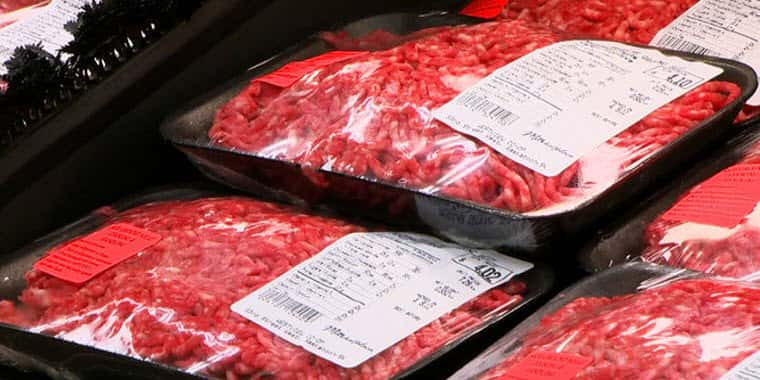by Chris Clayton DTN Ag Policy Editor
Senate Agriculture Committee Chairman Pat Roberts and his committee's ranking member, Sen. Debbie Stabenow, head into a hearing Thursday clearly divided on the issue of country-of-origin labeling for meat. Roberts is pushing for full repeal of the labels while Stabenow is pitching a voluntary approach to the problem.
Roberts' staff has been sending out press releases this week listing statements from COOL opponents spelling out all of the reasons COOL should be repealed. The chairman's staff also cited rhetoric from Canada over the wrath of retaliation that could come from Canadians if COOL is not repealed. The “fact sheet” declared “Retaliation Will Cost U.S. Billions of Dollars and Thousands of Jobs,” “Repeals is the Only Solution for Canada & Mexico — And Now the U.S.,” “The Timeline is Urgent” and “COOL has No Effect on Food Safety.”
Roberts, a Republican from Kansas, wants the Senate Ag Committee to essentially pick up the House-passed bill eliminating mandatory COOL and run with it.
Stabenow, a Democrat from Michigan, put forward a discussion draft on Wednesday of another possible option: a voluntary country-of-origin label for beef and pork. Stabenow's bill would create a program through USDA stating that a retailer may voluntarily label beef or pork that has an exclusive country of origin of the U.S.
“This approach is a pathway to finding a solution on country of origin labeling,” Stabenow said in a news release. “COOL serves an important role for consumers and industry. However, the WTO has been clear that we must find a solution that is consistent with our international trade obligations. This proposal offers a viable alternative and I look forward to discussing it at our hearing and with my colleagues in the Senate as we work to come to agreement on a bipartisan solution.”
Stabenow's bill would cover more than 92{f2533179b7c7e7cbdbc11018732de14c82f3d44c9f1e829e9a046cc47141a2e6} of the U.S. cattle slaughter and 95{f2533179b7c7e7cbdbc11018732de14c82f3d44c9f1e829e9a046cc47141a2e6} of the hog slaughter. (About 4{f2533179b7c7e7cbdbc11018732de14c82f3d44c9f1e829e9a046cc47141a2e6} of the cattle slaughtered in the U.S. come from Canada and about 3.6{f2533179b7c7e7cbdbc11018732de14c82f3d44c9f1e829e9a046cc47141a2e6} from Mexico. About 4.7{f2533179b7c7e7cbdbc11018732de14c82f3d44c9f1e829e9a046cc47141a2e6} of all hogs slaughtered in the U.S. came from Canadian feeder pigs.)
The National Farmers Union issued a statement praising Stabenow for looking for a solution that doesn't include outright repeal. Roger Johnson, president of NFU, stated that Stabenow's bill would solve the problems raised in the World Trade Organization rulings against the U.S.
“A voluntary approach for beef and pork is a prescriptive solution to a very narrow problem identified by the World Trade Organization,” Johnson said. “Furthermore, this approach is in concert with Canada’s own voluntary meat labeling process.”
House Agriculture Committee Chairman Michael Conaway issued a statement as well. He said Congress can talk about a voluntary label, but Congress needs to repeal the current law first. Conaway argues the labels are costly and provide no quantifiable benefits for consumers.
“Any conversation about a voluntary program must be preceded by a full repeal of COOL, as we have an obligation to our trading partners to come into compliance,” Conaway said.
Stabenow's approach also has been tried before. Prior to COOL being added to the 2002 farm bill, USDA had a voluntary meat labeling program that was not supported by the packing industry. As noted in an October 30, 2002, Federal Register notice by USDA, “For the past 3 years, FSIS and AMS have offered a voluntary program by which suppliers can place U.S.-origin declarations (certified to be accurate by USDA) on many of the meat products covered by this rule. However, no suppliers of these covered commodities have participated in this program.” P. 61,956, col. 1. http://www.gpo.gov/…
USDA also had a voluntary program that ran from 2002 through 2008, when mandatory COOL went into effect. http://www.gpo.gov/…
R-CALF provided those citations above. Bill Bullard, R-CALF's CEO, criticized the idea of going to a voluntary labeling program. “After fighting for over 15 years to first win and then defend our mandatory COOL (country of origin labeling) law, our members are not about to throw in the towel while our U.S. Trade Representative is still fighting to defend our sovereign right to maintain mandatory COOL in the current arbitration proceeding now underway at the WTO (World Trade Organization),” Bullard stated.
One issue that remains ignored in the debate about COOL is whether the laws or rules for U.S. domestic checkoffs could be changed to promote beef or pork from U.S. Born, Raised and Slaughtered animals. After all, that is exactly what Canada does, as noted by the Canadian Beef Inc. website. Canadian Beef Inc. cites a 2008 survey it commissioned to declare, “More than 90{f2533179b7c7e7cbdbc11018732de14c82f3d44c9f1e829e9a046cc47141a2e6} of retail and food service professionals surveyed indicated they preferred to purchase beef from cattle that were born, raised and slaughtered in Canada. This preference reflects the high quality of Canadian beef and the recognized desire of Canadian consumers to support domestic producers.” http://www.canadabeef.ca/…
© Copyright 2015 DTN/The Progressive Farmer. All rights reserved.


